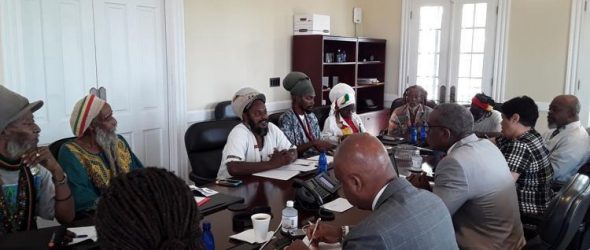ST. THOMAS – V.I. government efforts to create, regulate and ultimately cash in on a now-legal medical marijuana industry have many in the local Rastafari community feeling left out and embittered.
Rastafarians, who have long embraced the indigenous cannabis plant as a sacrament, and faced persecution and prosecution as a result, are now looking for justice – both economic and social – as the territory slowly warms to cannabis as a profitable, medicinal herb and less as a street drug.
“We’d like the V.I. government to acknowledge the injustices that we have faced, how it has caused our community to be economically disenfranchised,” said Ras Tzaddi Tafari, president of the V.I. Rastafari Sacramental Cannabis Council.
“We had to fight really hard to gain respect among our peers and community leaders, and we’d like the government to offer some form of restitution – what we call atonement,” he added.
The request for restitution was one of many made by the council during a face-to-face meeting with Gov. Albert Bryan Jr.; Lt. Gov. Tregenza Roach and Agriculture Commissioner Positive Nelson, on Oct. 1 at the Public Finance Authority building on St. Thomas.
The council, in describing cannabis as an integral part of their religion, requested that Rastafarians be issued a separate “sacramental license,” which would give them greater flexibility under the Virgin Islands Medical Cannabis Patient Care Act.
For instance, a Rastafarian individual or church would be permitted to grow more cannabis plants than what is stated in the law for the general public.
The council also requested that a member of the Rastafari community be given a seat on the nine-member Cannabis Advisory Board, which is tasked, by Dec. 31, to develop the rules and regulations governing marijuana use in the territory.
Tafari said Ras Bobby, an herbalist and council member, would be a “great asset” to the board, and could provide much-needed expertise on the production of seeds, dosage levels and breakdown of THC, or tetrahydrocannabinol, the principal psychoactive constituent of cannabis.
“Who knows more about cannabis than the Rastafari?” Tafari asked.
Other requests by the council included designated dispensaries for the Rastafari community and a holistic healing center, which could channel revenues back to the Rastafari community in the form of scholarships, summer camps and other programs.
Ras Bobby stressed, however, the council’s intent as beyond money-making.
“We want to be able to freely use the herb because that’s how we live,” he said. “We look at ourselves as a special case – and [the government] has to look at us in a special way.”
Bryan said he was open to the council’s requests, stating he would support an amendment to allow designated dispensaries for the Rastafari community on each island.
He also said legislation that aims to expunge the records of individuals convicted of certain marijuana-related offenses is expected in the near future.
Bryan said the “heaviest lift” would be getting a member of the council onto the Cannabis Advisory Board, stating the board plays more of a “regulatory” role than anything else, and may not be as consequential as the council thinks.
In terms of seeking justice, Bryan said, “being on the board doesn’t give you that.”
The idea of a sacramental license, however, was seen as a possibility. But questions lingered over who exactly should grant these licenses and how this regulatory body will determine who is an actual Rastafarian.
Roach said it would be a more “manageable approach” to have the council be the regulatory body for the Rastafari community, to develop its own regulations and interface with its members as to who should qualify for a sacramental license.
He stressed that legislation calling for such changes needed to be drafted in a very “clean and clear” manner in order to pass through the Legislature.
Nelson, while not adverse to having a member of the council on the Cannabis Advisory Board, urged council members to tenaciously engage the government, in the event they are unsuccessful.
“We all know that the Rastafari community has been involved in supporting cannabis for years and has been demonized for their use of cannabis. Now that there’s legalization, you would expect that they would have some involvement in the conversation,” he said.
The V.I. Rastafari Sacramental Cannabis Council formed earlier this year, but is already a burgeoning group with members from across the territory.
The council aims to bring unity among the Rastafari community, act as a liaison between the government and the people and educate citizens about Rastafari culture and history, which, according to Tafari, is rooted in spirituality.


